We may not have the course you’re looking for. If you enquire or give us a call on +420 210012971 and speak to our training experts, we may still be able to help with your training requirements.
Training Outcomes Within Your Budget!
We ensure quality, budget-alignment, and timely delivery by our expert instructors.
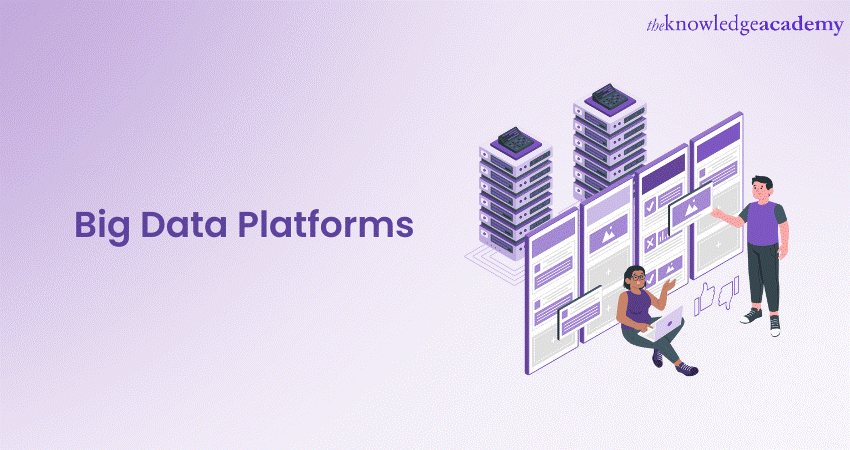
Have you ever wondered how organisations like Google and Amazon process and utilise the enormous data they collect daily? Or how can Healthcare Providers can predict patient outcomes with remarkable accuracy? Big Data Platforms are the engines behind these capabilities, offering scalable solutions for data storage, processing, and analysis.
Additionally, according to Statista, by 2029, the estimated value of the Big Data Analytics market is expected to reach over 525 billion GBP. Considering this situation, our blog aims to provide a detailed overview of these powerful systems that manage and analyse vast amounts of data. Read ahead to uncover the potential of Big Data Platforms.
Table of Contents
1) What is a Big Data Platform?
2) Features of Big Data Platforms
3) Components of Big Data Platforms
4) How do Big Data Platforms Work?
5) Benefits of using Big Data Platforms
6) Popular Big Data Platforms
7) Conclusion
What is a Big Data Platform?
A Big Data Platform functions as a structured repository for large volumes of data. These platforms utilise a combination of data management hardware and software tools to store and manage aggregated data sets, often in the cloud. They organise and maintain this extensive information in a coherent and accessible manner to derive meaningful insights.
Typically, these platforms blend various Data Management tools to handle data on a large scale, usually leveraging cloud storage.
Features of Big Data Platforms
Big Data Platforms are designed to handle and analyse vast amounts of data efficiently. Let’s explore some key features you can expect from these platforms:
1) Scalability: They can scale horizontally to manage increasing volumes of data without compromising performance.
2) Distributed Processing: They use distributed computing to process large datasets across multiple nodes, ensuring faster data processing.
3) Real-time Stream Computing: Capable of processing data in real-time, that is crucial for applications requiring immediate insights.
4) Machine Learning and Advanced Analytics: They offer built-in tools for Machine Learning and Advanced Analytics to derive actionable insights from data.
5) Data Analytics and Visualisation: Provide tools for Data Analysis and visualisation to help users make sense of complex data.
Components of Big Data Platforms
Big Data Platforms are complex systems designed to handle vast volumes of data, process it efficiently, and turn it into valuable insights. These platforms consist of several essential components, each playing a critical role in overall functionality.
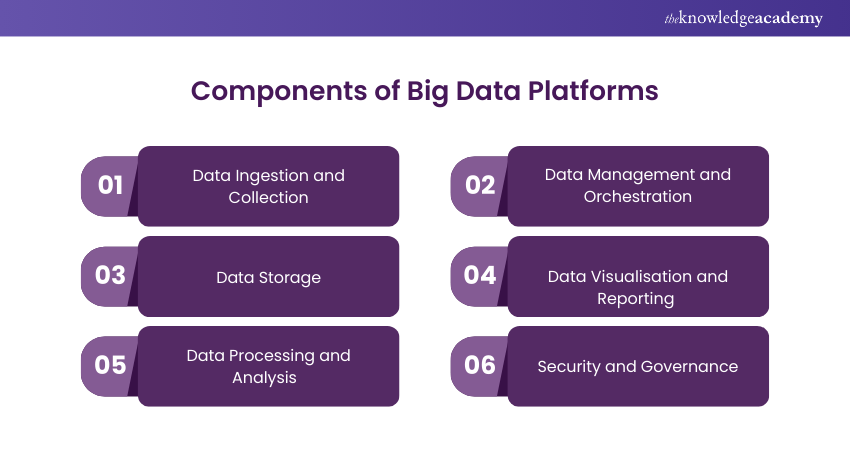
1) Data Ingestion and Collection
This is the first step in the Big Data journey. Data can come from various sources, including sensors, applications, social media, and databases. The data ingestion component is responsible for gathering this diverse data and making it ready for processing. It involves data connectors, adapters, and protocols to ensure data from different sources can be efficiently brought into the platform.
2) Data Storage
Once data is ingested, it needs a place to reside. Big Data Platforms employ a variety of storage solutions designed to handle large datasets. Common storage systems include distributed file systems (e.g., Hadoop HDFS, Amazon S3) and NoSQL databases (e.g., Apache Cassandra, MongoDB). These storage systems are optimised for scalability, fault tolerance, and high availability, ensuring data remains accessible and reliable even as it grows.
3) Data Processing and Analysis
This is the heart of Big Data Platforms, where data is transformed, processed, and analysed to extract meaningful insights. Processing engines and frameworks like Apache Spark, Apache Flink, and Hadoop MapReduce play a vital role in this component. They distribute and parallelise computations across clusters of machines, enabling the platform to handle massive workloads efficiently.
Elevate your skills with our expert-led Big Data Architecture Training – join us and learn to design, build and manage scalable Data Architectures!
4) Data Management and Orchestration
Managing and orchestrating data processing tasks across a distributed infrastructure is a complex task. The management layer includes components for resource allocation, job scheduling, and workflow orchestration. This layer ensures that data processing tasks run smoothly and efficiently, optimising resource utilisation.
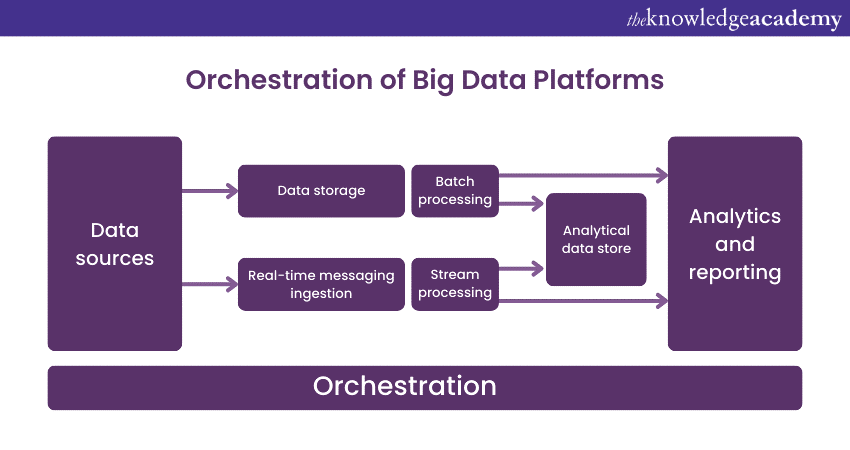
5) Data Visualisation and Reporting
The insights derived from Big Data analysis are only valuable if they can be understood and acted upon. This includes tools and technologies for data visualisation and reporting. This component allows users to create interactive dashboards, generate reports, and visualise trends and patterns in the data.
6) Security and Governance
Data security and governance are paramount in Big Data Platforms, especially when dealing with sensitive information. This layer includes components for authentication, authorisation, encryption, and auditing. It ensures that data is protected from unauthorised access and maintains compliance with regulatory requirements.
How do Big Data Platforms Work?
Big Data Platforms follow a structured process to enable companies to harness data for informed decision-making. This process involves several key steps:
a) Data Collection: This initial step systematically gathers data from various sources such as databases, social media, and sensors. Methods like web scraping, data feeds, APIs, and data integration tools are used to collect data, which is then stored in a central repository, often a data lake or warehouse, for easy access and further analysis.
b) Data Storage: After collection, data must be stored efficiently for retrieval and processing. Big Data Platforms typically use distributed storage systems like Hadoop Distributed File System (HDFS), Google Cloud Storage, or Amazon S3. This architecture ensures high availability, fault tolerance, and scalability.
c) Data Processing: Collected data is processed to extract valuable insights through operations such as cleaning, transforming, and aggregating. Platforms like Apache Hadoop and Apache Spark enable rapid computations and complex data transformations.
d) Data Analysis: This step involves examining and interpreting large data volumes to extract meaningful insights and patterns using machine learning algorithms, data mining techniques, or visualisation tools. The results inform data-driven decisions, optimise processes, and identify opportunities.
e) Data Quality Assurance: Ensuring data accuracy, consistency, integrity, relevance, and security is crucial. Techniques like data quality management, lineage tracking, and cataloguing help maintain robust data quality, giving organisations confidence in their decision-making data.
f) Data Management: This involves organising, storing, and retrieving large data volumes. Techniques such as data backup, recovery, and archiving ensure fault tolerance and optimised data retrieval for various use cases.
Benefits of Using Big Data Platforms
There are various benefits of using Big Data Platforms, which are discussed below:
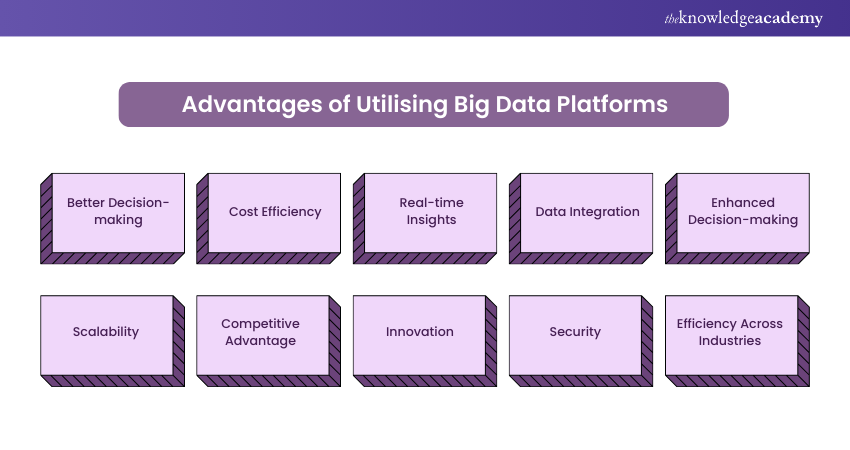
a) Big Data Integration Platforms help organisations make smarter decisions by providing insights from vast datasets, ensuring that choices depend on facts rather than guesswork.
b) These platforms streamline data storage and processing, reducing infrastructure costs and making Data Management more affordable.
c) Big Data Platforms enable real-time Data Analysis, allowing companies to respond quickly to changing situations and seize opportunities as they arise.
d) They help integrate data from various sources, creating a unified view of information and facilitating comprehensive analysis.
e) With better insights, organisations can tailor their services, products and strategies to meet customer needs more effectively, increasing satisfaction and loyalty.
f) Big Data Platforms can expand effortlessly to accommodate growing data volumes, ensuring they remain effective as organisations evolve.
g) Those who harness Big Data gain an edge by staying abreast of the competition and providing superior products and services.
h) These platforms spark innovation by revealing trends, gaps, and opportunities, driving the development of new products and services.
i) Big Data Platforms offer robust security features to protect sensitive data, mitigating risks in an increasingly complex Cyber Security landscape.
j) They improve operations across sectors, from manufacturing to healthcare, increasing efficiency and reducing waste.
Popular Big Data Platforms
Big Data Platforms are capable of handling massive amounts of data and turning it into some valuable information. Here, we'll introduce you to a list of those platforms:
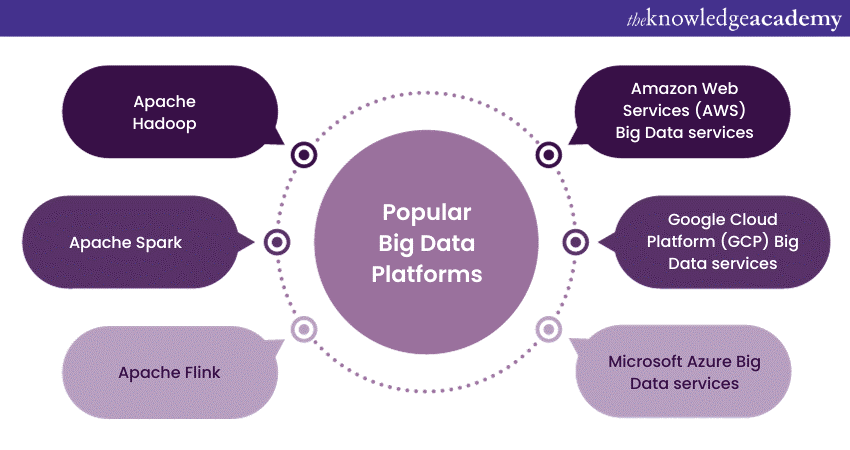
a) Apache Hadoop: Apache Hadoop is an excellent platform for keeping and processing large volumes of data. It's like a robust storage and data processing system that companies use to handle and manage massive datasets.
b) Apache Spark: Apache Spark is known for its speed and efficiency in analysing data. It's like a powerful tool that helps organisations quickly make sense of their data and extract valuable insights from it.
c) Apache Flink: Apache Flink is another data processing platform, similar to Spark, that specialises in real-time Data Analysis. It's used for tasks where speed and low latency are critical, like monitoring online activities or financial transactions.
d) Amazon Web Services (AWS) Big Data services: AWS offers a suite of Big Data services that run in the cloud. These services make it easier for companies to store, process, and analyse data without the need for extensive infrastructure management.
e) Google Cloud Platform (GCP) Big Data services: Similar to AWS, Google Cloud Platform provides a range of Big Data services in the cloud. These services help organisations leverage Google's computing power and data analytics capabilities.
f) Microsoft Azure Big Data services: Microsoft Azure offers various Big Data services, including data storage, processing, and analytics tools. These services are designed to help businesses work with their data efficiently and effectively.
Join our Hadoop Administration Training and learn everything from installation to troubleshooting – secure your spot now!
Conclusion
In conclusion, Big Data Platforms are transforming how you comprehend and utilise data. From enhancing business strategies to predicting future trends, their impact is undeniable. So, harness the power of Big Data for your own success and explore the endless possibilities that await!
Elevate your Big Data Analysis skills with our Big Data Analysis Course - Join now!
Frequently Asked Questions

Big Data denotes the vast volumes of structured and unstructured data generated at high velocity. It is important because it enables businesses to gain insights, improve decision-making, and drive innovation by analysing complex data patterns and trends.

A good Big Data Platform should offer scalability, high-speed data processing, robust security, real-time analytics, and seamless integration with numerous data sources and tools. It should also provide user-friendly interfaces and support for diverse data types and formats.

The Knowledge Academy takes global learning to new heights, offering over 30,000 online courses across 490+ locations in 220 countries. This expansive reach ensures accessibility and convenience for learners worldwide.
Alongside our diverse Online Course Catalogue, encompassing 17 major categories, we go the extra mile by providing a plethora of free educational Online Resources like News updates, Blogs, videos, webinars, and interview questions. Tailoring learning experiences further, professionals can maximise value with customisable Course Bundles of TKA.

The Knowledge Academy’s Knowledge Pass, a prepaid voucher, adds another layer of flexibility, allowing course bookings over a 12-month period. Join us on a journey where education knows no bounds.

The Knowledge Academy offers various Big Data and Analytics Trainings, including the Big Data Analysis Training, Big Data Architecture Training, and Data Science Analytics Training. These courses cater to different skill levels, providing comprehensive insights into Big Data Analyst Job Description.
Our Data, Analytics & AI Blogs cover a range of topics related to Big Data Analysis, offering valuable resources, best practices, and industry insights. Whether you are a beginner or looking to advance your Data Analysis skills, The Knowledge Academy's diverse courses and informative blogs have got you covered.
Upcoming Data, Analytics & AI Resources Batches & Dates
Date
 Big Data Analysis
Big Data Analysis
Fri 28th Feb 2025
Fri 4th Apr 2025
Fri 27th Jun 2025
Fri 29th Aug 2025
Fri 24th Oct 2025
Fri 5th Dec 2025







 Top Rated Course
Top Rated Course



 If you wish to make any changes to your course, please
If you wish to make any changes to your course, please


